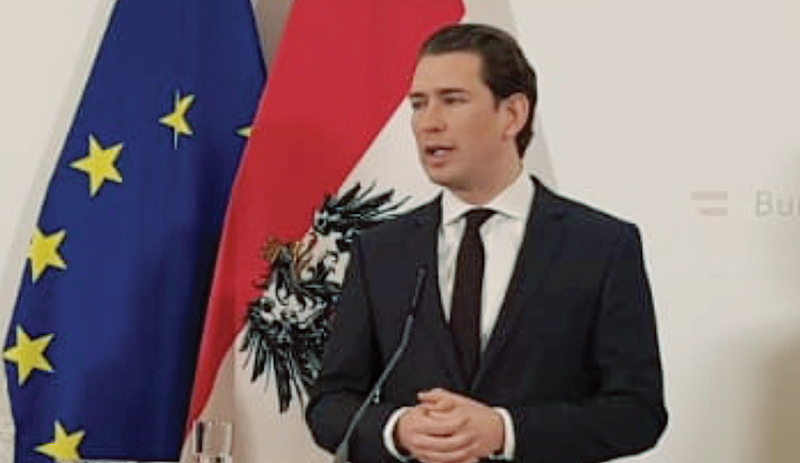Austria hails Amir's humanitarian role
VIENNA: Chancellor of Austria Sebastian Kurz is set to make an official visit to Kuwait today, the second one for an Austrian chancellor since the late Bruno Kreisky visited the country back in the 1980s. Kurz's visit coincides with the 54th anniversary of establishing diplomatic relationship between the two countries, which has been based on mutual respect and trust. It aims to expand their bilateral ties to higher horizons.
The Austrian chancellor's visit takes place less than a month since his meeting with His Highness the Amir Sheikh Sabah Al-Ahmad Al-Jaber Al-Sabah at an Arab-EP summit in Egypt's resort city of Sharm El-Sheikh last February. The visit holds a great importance on the Kuwaiti-Austrian relationship in terms of backing and boosting bilateral ties in various fields, particularly commercial as Kurz tends to expand the current "modest" volume of commercial exchange between the two countries.
During his visit, he is to hold talks with His Highness the Prime Minister Sheikh Jaber Al-Mubarak Al-Hamad Al-Sabah and several other senior Kuwaiti officials. Talks will focus on significant common issues and affairs as well as bilateral economic cooperation in the areas of infrastructure, hospitals, power plans and oil refineries.

Distinctive cooperation
Ex-Chancellor Kreisky's first official visit to Kuwait in 1981 contributed greatly in laying the cornerstone for the distinctive Kuwaiti-Austrian cooperation march. The two countries' relationship had seen significant developments over the past years, notably the official opening of the first Austrian embassy in Kuwait only four years after Kreisky's maiden visit to the country. Furthermore, Kuwait is the first Arab state to establish political, diplomatic, and economic relationship with Austria, opening its embassy in Vienna officially in 1984 and had had six ambassadors who contributed in bolstering ties with the EU-member state.
The first-ever head of Kuwaiti diplomatic mission to Vienna was Ambassador Abdulhameed Al-Awadhi, who personally took up the task of establishing the Kuwaiti embassy in Austria and forming its staff. He was succeeded later on by Ambassador Faisal Al-Ghais, who carried out his diplomatic duties for seven years.In 1999, Nabeela Al-Mulla became Kuwait's ambassador to Austria. She also became ambassador extraordinary, plenipotentiary, and permanent representative of Kuwait at the UN and other international organizations in Vienna. Mulla was also the first woman from the Middle East and South Asia region to chair the Board of Governors of the International Atomic Energy Agency (IAEA) in 2003.In 2004, Fawzi Al-Jasem became Kuwait's ambassador to Austria and contributed in completing all construction works for the embassy's new building in Vienna. He was succeeded later on by Ambassador Mohammad Al-Sallal. In 2013, Sadeq Maarafi became and still is Kuwait's ambassador to Austria. He continues to carry on the same diplomatic approach as did his predecessors and exerts great efforts to boost bilateral ties with the European country, UN bodies, and Arab diplomatic corps in Vienna.
Throughout the past 54 years, Kuwait and Austria singed several cooperation agreements, including MoUs, in political, economic, scientific, air transport, promotion and protection of investments, and double tax avoidance fields, in addition to signing of various cooperation protocols between Kuwait Chamber of Commerce and its Austrian counterpart. Moreover, Kuwait News Agency has played an effective role in boosting the two countries' relationship as the first Arab news agency to open and operate a bureau in Vienna since the early 1980s.KUNA's reporters have also contributed greatly in strengthening Kuwait's relationship with Austria and UN bodies in Vienna over the past decades through their extensive coverages of various events. Such great journalistic efforts have prompted the Austrian government to award KUNA a certificate of merit in 2006 in appreciation for its role in boosting the EU-member state's relationship with Kuwait and Arab countries.
Amir's humanitarian role
Kurz said his country strongly appreciates the role of His Highness the Amir Sheikh Sabah Al-Ahmad Al-Jaber Al-Sabah as a Humanitarian Leader and mediator for resolving regional issues.His Highness the Amir is a wise leader and an expert in foreign politics, since he had previously served as Foreign Minister for about 40 years, Kurz said yesterday prior to his official visit to Kuwait. He hailed His Highness Sheikh Sabah's efforts in mediating to resolve the ongoing crisis among the GCC countries. Kurz also underlined the strong Kuwaiti-Austrian ties that go back to 1965, adding that there are thousands of Kuwaitis visiting Austria each year to enjoy its beauty.
Speaking on Kuwait's humanitarian work, the chancellor applauded the country's hosting of several donors' conferences for Iraq and Syria. The Kuwaiti aid saved lives and eased the suffering of people in so many countries including Syria, Iraq, Chad, Somalia, and Ethiopia, Kurz added. The Austrian diplomat also underlined Kuwait's contribution to the Ban Ki-moon Center for Global Citizens (BKMC). Meanwhile, Kurz noted that his country is willing to take part in Kuwait Vision 2035 through executing projects for infrastructure, medical care or energy.
Chance to boost ties
Kuwaiti Ambassador to Austria and Permanent Envoy to the UN Sadiq Marafi underlined the importance of the Austrian Chancellor's upcoming visit to Kuwait for boosting bilateral ties. Marafi noted the strong Kuwaiti-Austrian ties on different levels. He added that the Austrian Government strongly appreciates Kuwait's successful neutral foreign policy. The ambassador also said that the two countries' relations are growing stronger, mentioning in this respect the visit of Austrian Foreign Minister Karin Kneissl to Kuwait last December. - KUNA




